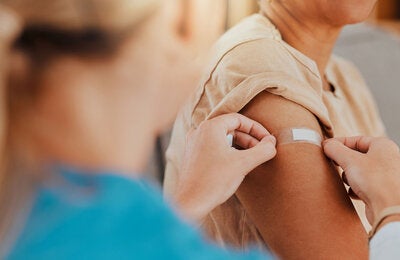

More than 14,000 Brazilian and foreign physicians taking part in the "Mais Médicos" (More Physicians) Program ensure the provision of care to 48.6 million people in the most underserved areas of Brazil. This initiative is closing gaps on access to services and improving the health of the most vulnerable populations.
More than 14,000 Brazilian and foreign physicians taking part in the "Mais Médicos" (More Physicians) Program ensure the provision of care to 48.6 million people in the most underserved areas of Brazil. This initiative is closing gaps on access to services and improving the health of the most vulnerable populations.
Pernambuco, Brazil, 8 July 2014 (PAHO/WHO) - Four years had passed since the São Domingos Family Health Unit, in the Brazilian municipality of Brejo da Madre de Deus, had been staffed by a physician. When money and time allowed, farmer Maria do Carmo Berlamino Noé traveled to the municipal polyclinic to manage her blood pressure, seek care when she had high fever, or for any other issue that a provider at the local health center near her home could have addressed.
But physicians rarely came to this marshland community located 202 km from Recife, the capital of the State of Pernambuco. However, access to health care is changing in Brejo, as in 700 other of the poorest and farthest municipalities of Brazil, since foreign physicians started coming to cover a deficit of health care providers, within the framework of the "Mais Médicos" Program.
"Things weren't good before: there were no doctors, there were no medicines, we had to travel far to see a doctor. Everything's changed now", said Maria before her appointment with Cuban physician Teresa Rosales Fonseca.
Teresa arrived in Brazil on 1 October 2013, alongside her husband, comprehensive family medicine specialist Alberto Vicente Osorio Douglas. During their first 21 days in Brazil, they took Portuguese classes and received information on the Brazilian Unified Health System (SUS), which ensures free access to health care for the entire population.
Teresa and Alberto are two of the approximately 700 health professionals working in Pernambuco within the framework of the "Mais Médicos" Program, who have provided care to over 1,7 million people.
According to the State Secretary of Health, Antonio Carlos Figueira, "'Mais Médicos' has been very well accepted, both in major cities and in outlying areas". Currently, more than 14,000 foreign physicians are taking part in the program, most of whom are Cuban. Their services now reach 48,6 million people.
Closing the gap between the population and care
"We thought acceptance would be very difficult, but everything was different and unexpected", said Teresa. When she and her husband first came to Brejo, they were surprised by how the town's elderly inhabitants "went down on their knees and thanked God for the arrival of a physician at their community".
According to this Cuban physician, a 1990 graduate of Instituto Superior de Medicina de Cuba, the predominant conditions in the community are hypertension and diabetes. "All are preventable, but they've been alone for so long, without a doctor, and, perhaps, without much information". Teresa stated that real medicine comes before the disease, and "works toward prevention and health promotion".
Alberto, who met his wife during a similar medical mission to Venezuela, pulls up a chair to see the day's first patient. "We have the patient sit down on one side, always very close to us, and examine them", he said, describing the characteristic practice of Cuban physicians, and assured he felt "happily moved" whenever a patient left his office with a smile on his or her face.
Solaya brought her daughter to the health unit staffed by "doctor Alberto", as he is known to the team at Posto de Saúde III. "Before, we would come and there would be no doctor. We'd make an appointment and they'd send us to the polyclinic, which is far away", said the housewife. After her visit, she concluded: "I liked it very much. I'm happy".
To Osmani Maria Da Silva, one of the community health agents at the unit, "to have [a doctor] working 8-hour days is a dream come true ". Nurse Luciana highlighted the fact that she is less overwhelmed by work and that patients are seeing the doctor more often. "Before, even a case of fever would have to be referred elsewhere; not anymore. The doctor is contributing much to the clinic, and although he is Cuban, he speaks Portuguese very well; the population likes him very much and have no trouble understanding him", she assured.
On average, Alberto and Teresa see 500 patients a month each. "This has reduced overcrowding at the polyclinic and reassured patients", stressed the municipal Secretary of Health of Brejo, Lucia de Fátima Santos.
Free care for the whole population
The need for a program such as "Mais Médicos" points to an immediate response to a problem Brazil shares with other countries: the national health care workforce is not distributed geographically in such a way as to meet the needs of the population, noted Alberto Kleiman, head advisor for international affairs of the Brazilian Ministry of Health.
The Cuban Minister of Health, Roberto Morales Ojeda, believes the program is helping reduce inequities by bringing health to the poorest populations. According to Morales Ojeda, when Cuban health care professionals are deployed on overseas missions, they do so to "collaborate and pay their debt to humankind". Cuba has one of the world's highest densities of physicians per population.
A cooperation agreement with the Pan-American Health Organization (PAHO), the WHO Regional Office for the Americas, facilitates international deployment of Cuban physicians. To compile lessons learned from this experience for Brazil and for other countries seeking to move toward universal health coverage, PAHO is studying the impact of this program on the health system and on the health of the population.
"'Mais Médicos' is one of the main efforts of Brazil in advancing toward universal health coverage for its population, as it provides a response to the constitutional mandate for a universal, public, and free health system for the entire population of Brazil. It also constitutes an important step toward increasing public investment in health", noted the PAHO/WHO Representative in Brazil, Joaquín Molina.
Cuban cooperation worldwide
Cuba began its international cooperation in health in 1960 with humanitarian assistance to Chile, and consolidated it in 1963 with the first international medical brigade, sent to Algeria.
Around 45,000 health professionals-roughly 20,000 of whom are physicians-are cooperating in 60 countries across Latin America, Africa, Asia, Europe (Portugal), and Oceania.
Over the last 54 years, more than 120,000 physicians, 70,000 licensed nurses, 18,000 dentists, and 60,000 health technicians have graduated in Cuba, as have more than 25,000 foreign students from 124 countries.
On the other hand, more than 3,000 Cuban instructors are training human resources in health in other countries, including Angola, Bolivia, Eritrea, Gambia, Guinea-Bissau, Equatorial Guinea, Tanzania, East Timor, and Venezuela.
Links:
- "Mais Médicos" Program (in Portuguese)
- Video: More Doctors for Brazil: Health for the Most Vulnerable Communities Youtube | Vimeo



